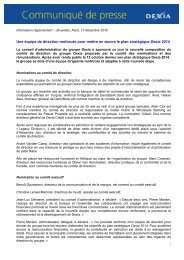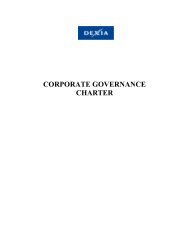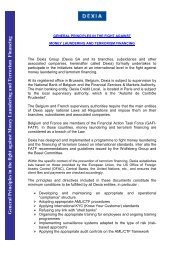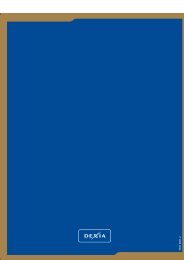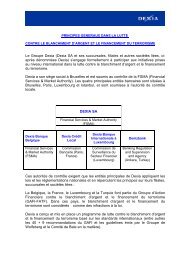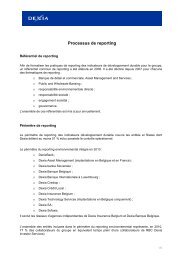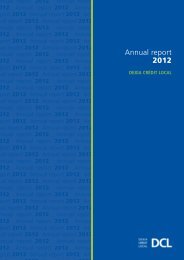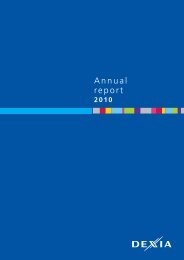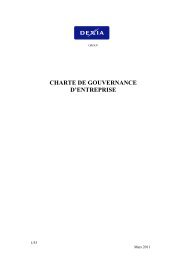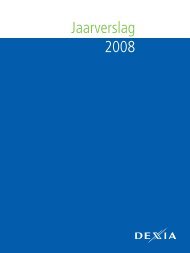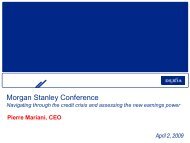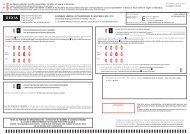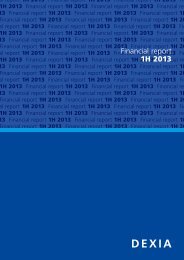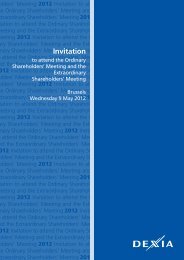Annual report 2009 - Dexia.com
Annual report 2009 - Dexia.com
Annual report 2009 - Dexia.com
- No tags were found...
You also want an ePaper? Increase the reach of your titles
YUMPU automatically turns print PDFs into web optimized ePapers that Google loves.
General information3. Overview of the directholdings of <strong>Dexia</strong> SA as at31 December <strong>2009</strong>The 11 direct holdings of <strong>Dexia</strong> SA as at 31 December <strong>2009</strong>are as follows:• 100% in <strong>Dexia</strong> Bank SA (Belgium);• 100% in <strong>Dexia</strong> Crédit Local SA (France);• 57.68% in <strong>Dexia</strong> Banque Internationale à Luxembourg SA(Luxembourg);• 100% in <strong>Dexia</strong> Management Services Ltd (UnitedKingdom);• 99.99% in <strong>Dexia</strong> Participations Luxembourg SA (Luxembourg),which holds 42.23% of <strong>Dexia</strong> Banque Internationaleà Luxembourg SA;• 10% in <strong>Dexia</strong> Holdings Inc., the parent <strong>com</strong>pany of <strong>Dexia</strong>FP Holdings Inc. (USA);• 100% in <strong>Dexia</strong> Nederland Holding NV (Netherlands);• 100% in <strong>Dexia</strong> Funding Luxembourg SA (Luxembourg);• 95.39% in <strong>Dexia</strong> Participation Belgique SA, which holds99.84% of DenizBank AS;• 99.40% in Associated <strong>Dexia</strong> Technology Services SA(Luxembourg);• 0.01% in Deniz Faktoring AS (Turkey), 99.99% being heldby DenizBank AS.<strong>Dexia</strong> SA has two permanent offices, one in France and onein Luxembourg.4. Litigations4.1. <strong>Dexia</strong> Bank Nederland NV4.1.1. BackgroundThe difficulties linked to the share-leasing activities of theformer Bank Labouchere (now <strong>Dexia</strong> Bank Nederland NV,hereinafter referred to as DBnl) appeared at the time ofthe fast and severe fall of the Amsterdam stock marketin late 2001. The value of the securities used as collateralagainst the loans granted by DBnl proved insufficient in alarge number of contracts, thus potentially ending with aresidual debt instead of the gain initially hoped for. Referenceis made to the detailed disclosures, as contained inthe <strong>Dexia</strong> <strong>Annual</strong> Report 2008 (particularly on pages 91to 92, including the consequences of the decision of theNetherlands Supreme Court of 28 March 2008, in respectof the so-called spouse consent matter) and in the FinancialReports published during the year <strong>2009</strong>, which are availableon www.dexia.<strong>com</strong>.4.1.2. Specific litigationsOn 5 June <strong>2009</strong>, the Netherlands Supreme Court made animportant ruling in respect of the share-leasing contracts ofDBnl. Many allegations have been rejected, including error,misleading advertising, abuse of circumstances, and the applicabilityof the Netherlands Consumer Credit Act.However, this decision also states that, generally speaking,DBnl had a special duty of care to inform and to warn itsclients “... in clear and in unmistakable terms...” about therisks involved in share-leasing contracts, including the possibilityof a so-called residual debt. Additionally, this rulingstates that DBnl failed in respect of its obligation to check,prior to entering into the contract, on the in<strong>com</strong>e and wealthof the client. Therefore, for clients with sufficient financialcapacity at the date they entered the share-leasing contract,DBnl has to grant a discount basically of 60% of the totalresidual debt. Other clients, who have been faced with anunreasonable heavy financial burden, are also, in additionto a discount of the residual debt, awarded a repayment inmost cases of 60% of the instalments they have made. Thedistinction between those two categories of clients neededfurther interpretation by judges, based on the de facto position,and on a case-by-case basis.Subsequently, on 1 December <strong>2009</strong>, the Amsterdam Courtof Appeal made four detailed rulings, in respect of the preciseway the distinction of the Netherlands Supreme Courtbetween those two categories of clients should have beenmade. Clients stating that they have been faced with anunreasonable heavy financial burden, have the obligation tofurnish the facts. The Court of Appeal also ruled on someother issues, including the fact that profits from earlier shareleasingproducts should be taken into account, and the <strong>com</strong>mencingdate of the legal interest.4.1.3. Number of court casesAs at 31 December <strong>2009</strong>, DBnl is still involved in over3,400 civil cases. However, the vast majority of these caseshave been suspended. The number of clients in proceedingswill decrease in 2010 because of settlements expected afterthe judgements of the Supreme Court and the AmsterdamCourt of Appeal.4.1.4. Litigations in generalA number of disputes have arisen between DBnl and itsclients with respect to share-leasing products. Particularly inview of the nature of these disputes, <strong>Dexia</strong> refers to its earlier<strong>report</strong>s and financial <strong>report</strong>s. Generally speaking, only theapproximately 19,000 clients that filed a so-called opt-outstatement before 1 August 2007, and did not enter into anysettlement since then, are still entitled to start or to continueproceedings against DBnl.4.1.5. Dutch Securities Institute (DSI)At the end of <strong>2009</strong>, no cases were still under considerationby the Grievance Committee of DSI, or under considerationby the Appeals Committee of DSI.4.1.6. Depot LeaseThe Duisenberg Arrangement is not applicable to the groupof approximately 5,500 clients who entered into share- leasingManagement <strong>report</strong>Consolidatedfinancial statements<strong>Annual</strong> financial statementsAdditional information<strong>Annual</strong> <strong>report</strong> <strong>2009</strong> <strong>Dexia</strong> 87



